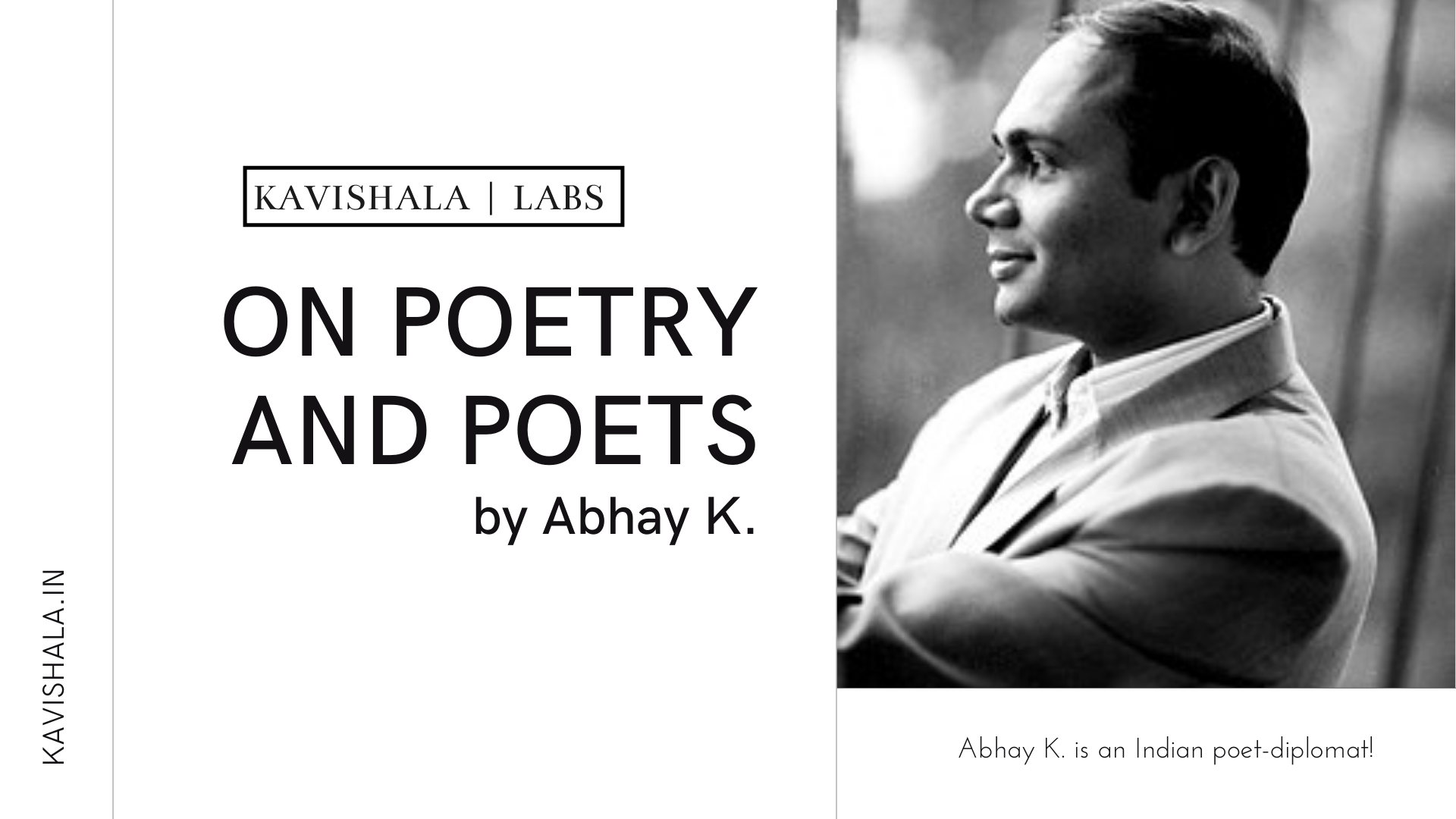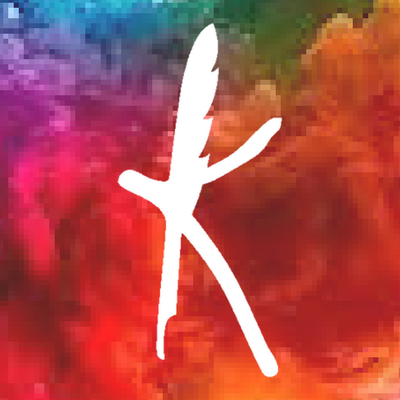
I have been dreaming poetry
and I see in my dreams
poems written in the eyes of galloping Pegasi
on shells of crawling snails
printed on colourful wings of swarming butterflies
on the serrated teeth of giant killer sharks
on the claws of eagles hovering in the sky
poems on the bodies of naked angels
poems flowing in the veins of buffaloes
on the petals of roses
poems rising as cacti thorns
I see poems swimming like blue whales
rising like a phoenix from the ashes of burnt books
I see poems smiling, whispering to me
in weird voices.
'What is Poetry?'
Most of the poets and even those who are not poets ask this question at one or the other stage while writing or reading poetry.
Poetry has as many definitions as there are poets and poetry readers. Poetry is like a giant elephant and poets are blind men, each with their own description of this humongous creature.
The great German poet Goethe pronounced that those who had no ears for poetry and music were barbarians.
Kavi Bhratihari's bold pronouncement -'Sahitya Sangeet Kala Vihinah, Sakshatyapashu puchhavishanhinah' , echoes Goethe's sentiments.
For the English poet William Wordsworth, poetry was spontaneous overflow of powerful feelings.
This is also the view of Sumitranandan Pant who wrote - Viyogi hoga pahla kavi / aah se upja hoga gaan/umad kar ankhon se chupchap/bahi hogi kavita anjaan.
But there is much more to poetry than spontaneous overflow of powerful feelings. Wordsworth and Sumitranandan Pant probably forgot about the art and craft of poetry.
Poet Samuel Taylor Coleridge defined poetry as best words in the best order which also holds good for prose or other writings. Charles Dickens, though not known as a poet, thought poetry made life what lights and music did to the stage.
The British poet Matthew Arnold had a philosophical take on poetry. For him poetry at the bottom of all was criticism of life. He thought poets as nagging creatures, complaining about life.
Echoing the sentiments expressed by Goethe and Bhratihari who compared humans with no taste for poetry with barbarians and animals, Russian Nobel Laureate Joseph Brodsky said -'What distinguishes us from other members of the animal kingdom is speech, then literature - and poetry in particular, being the highest form of locution - is, to put it bluntly, the goal of our species.' Brodsky describes poetry as a unique art form, like no other. In his Nobel Prize acceptance speech he elaborated on this uniqueness of poetry- 'There are, as we know, three modes of cognition: analytical, intuitive, and the mode that was known to the Biblical prophets, revelation. What distinguishes poetry from other forms of literature is that it uses all three of them at once (gravitating primarily toward the second and the third). For all three of them are given in the language; and there are times when, by means of a single word, a single rhyme, the writer of a poem manages to find himself where no one has ever been before him, further, perhaps, than he himself would have wished for.' Poet and poetry readers are surprised at poetry’s power to reveal rare and unexpected relationships among words, thoughts, ideas. I have found my own poems revealing to me. For example-Quark of a poet/blossoming in the subatomic space/writing the uni-verse.
What is revelatory here is quark as a poet and universe as one verse being written by a quark-poet. I have come across such revelation often in my own works that has left me awestruck, breathless.
Pablo Neruda, one of the greatest poets of the 20th century believes that poetry reveals the secret manifestations of nature. He writes in his memoirs - 'I believe that poetry is an action, ephemeral or solemn, in which there enter as equal partners solitude and solidarity, emotion and action, the nearness to oneself, the nearness to mankind and to the secret manifestations of nature.' Here is my poem ‘Neem’ that reveals relationship between Delhi and itself-Under my ubiquitous shade/lie scattered cities of Delhi/I and Delhi are one and the same/my yellow-greenish fruits/ delicious when ripe/ bitter when raw/only the wise know the difference.
The great poet from the Caribbean Derek Walcott echoed the sentiments of Brodsky and Neruda when he spoke in his Nobel lecture- 'poetry is perfection's sweat but which must seem as fresh as the raindrops on a statue's brow, combines the natural and the marmoreal; it conjugates both tenses simultaneously: the past and the present, if the past is the sculpture and the present the beads of dew or rain on the forehead of the past. There is the buried language and there is the individual vocabulary, and the process of poetry is one of excavation and of self-discovery.'
One should mark these words- ‘the process of poetry is one of excavation and of self-discovery.‘
And I made a self discovery when these lines came to me one evening while walking the stretch that connects Kirorimal College to Delhi School of Economics, St. Stephen’s College and the Delhi University’s Rose Garden-I was always here/as the blowing wind/or the falling leaves/ as the shining sun/or the flowing streams/as the chirping birds/or the blooming buds/ as the blue sky/or the empty space/ I was never born/I didn’t die.
Here poetry rhythmically restructures time. It transforms the mortal into the eternal.
Seamus Heaney, who passed away in 2013, called the process digging. A rather well known line from his eponymous poem-Between my finger and my thumb/The squat pen rests, snug as a gun/I’ll dig with it.
As a man dedicated to poetic form he observed- 'Poetic form is both the ship and the anchor... what the necessary poetry always does, which is to touch the base of our sympathetic nature while taking in at the same time the unsympathetic nature of the world to which that nature is constantly exposed. The form of the poem, in other words, is crucial to poetry's power to do the thing which always is and always will be to poetry's credit: the power to persuade that vulnerable part of our consciousness of its rightness in spite of the evidence of wrongness all around it, the power to remind us that we are hunters and gatherers of values, that our very solitudes and distresses are creditable, in so far as they, too, are an earnest of our veritable human being.'
Poetry provides us with daily dose of ecstasy. It takes us to a higher plane of existence away from the quotidian existence. Emerson says 'Take all away from me, but leave me poetry.' I believe Poetry liberates.
Why write poetry
As per Brodsky a person sets out to write a poem for a variety of reasons: to win the heart of his beloved; to express his attitude toward the reality surrounding him, be it a landscape or a state; to capture his state of mind at a given instant; to leave - as he thinks at that moment - a trace on the earth.
The nature of poetry one writes evolves with time. Almost all of us start writing poetry with love poems. Then the subject of our poetry gets diversified slowly with time. The highest stage of writing poetry comes when the poets become the voice
No posts
No posts
No posts
No posts

Comments